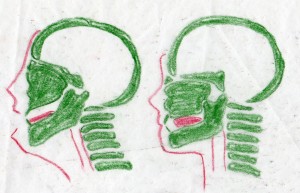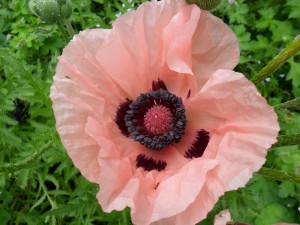And some showy pink.
One of my earlier blog posts focused on the importance of nasal breathing (rather than mouth breathing) for good health. I gave you seven reasons, and I think it is about time for a few more – here are three good ones:
1) Nasal breathing is good for head and neck stability and strength.
The tongue is a very strong muscle and when it is pressed into the roof of the closed mouth and the head stays balanced at the top of the neck, and the ribcage is stacked above the pelvis there is great strength and stability (right hand image). If the nose is bypassed, and the mouth is open to breathe through, with the tongue away from the roof off the mouth, the head tends to jut forward to keep the airway open, the neck and shoulder and jaw muscles can be strained and the ribcage position compensates so vertical stacking over the pelvis is lost. This leads to a postural instability, inefficiency and muscular strain, TMJ (jaw problems), and poor breathing control (left hand image). Closing the mouth helps get the head, shoulders, neck, jaw and ribcage back in position and takes the strain and effort out of breathing.
I am learning more and more how important posture can be not just for breathing but for all of the body’s functions. To be continued…, watch this space…!
2) Nasal breathing helps to set the breathing pattern or rhythm.
There are sensors in the nasal cavity that not only detect odours in the environment, but also the temperature of the air and the flow of the air coming in. The environment is continually monitored and breathing is automatically changed to suit the changing environment. Breathing in cold air can reduce breathing rate, a good adaptation to keep warm and to keep blood circulating to the extremities. Mouth breathing would override this mechanism, so losing one control mechanism.
3) Mouth breathers have lower CO2 in their systems, therefore lower oxygen in their cells.
This is the really important topic of unbalanced blood gases, and one of the main factors in chronic hyperventilation; lowered CO2 levels (hypocapnia) have widespread consequences from tightened airways (broncho-constriction) to narrowed blood vessels (cold hands and poor circulation) and poor oxygen availability (brain fog etc). On its own this is a massive topic so I will just point you to a list of symptoms linked to over breathing and low CO2 (hypocapnia or carbon dioxide syndrome) and go into more detail in future posts.
In the case of CO2 levels, nose breathing is best because a) the pathway from lung to fresh air is a bit longer, increasing the “dead space” and that b) the airways resistance is a bit higher when nasal breathing. Both these factors can help keep CO2 levels up (I won’t go into the whys and wherefores here).
Are you convinced? Try breathing through your nose, pace yourself so that you can breathe through your nose ALL the time, even when climbing stairs or walking uphill. It doesn’t matter if you have to slow down for now. Let me know how you get on, you may be surprised!
If you would like an email alert when I post a new blog, please sign up below:


Dear doctor,
I have been diagnosed with early stage of fibrosis .i cough a lot. How can you help me . Will breathing through the nose help?
Thank you
Devi
I am sorry that you are suffering with fibrosis. Gentle nasal breathing could help. Try to pace yourself so that you can breathe through the nose all the time.
Hi Janet, Barrie here, just a short comment, since I started conscious nasal breathing my posture has improved dramatically, it was only yesterday I looked in the mirror and my shoulders looked strong, I tried to improve them by trying to pull my shoulders back like I used to, I couldn’t move them back at all.
Thanks for the update Barrie, you are going from strength to strength with the nasal breathing!
Hi Janet, my nasal breathing day and night is now normal, a lot of improvements that you know happens, here is one that is not mentioned but it’s intetesting, I know my speech has improved, recently I tried doing tongue twisters, a massive improvement, this is obviously with my tongue being on my upper palette for over twelve months something had changed!
Thank you for sharing this Barrie, yes tongue position is important as well as nasal breathing. And we don’t get taught this stuff!
Interesting as always, just to be uninteresting, the tongue is not one muscle it is eight muscles.
You are correct about the eight muscles in the tongue. And hopefully not tongue-tied!